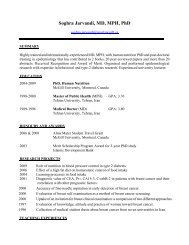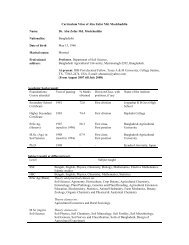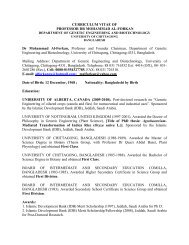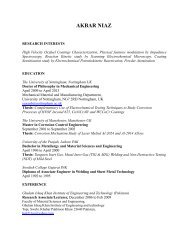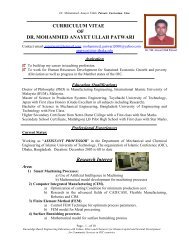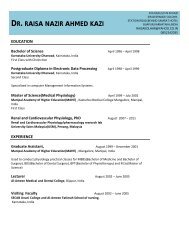Engineering: issues, challenges and opportunities for development ...
Engineering: issues, challenges and opportunities for development ...
Engineering: issues, challenges and opportunities for development ...
Create successful ePaper yourself
Turn your PDF publications into a flip-book with our unique Google optimized e-Paper software.
ENGINEERING: ISSUES CHALLENGES AND OPPORTUNITIES FOR DEVELOPMENT The annual report onengineering in the UK.promoting engineering skills, <strong>and</strong> disseminating scientific <strong>and</strong>technical matters. Besides CNISF, consulting engineers are representedby two main organizations, SYNTEC <strong>and</strong> CICF.United KingdomJim BirchThe <strong>Engineering</strong> Council UK <strong>and</strong> the <strong>Engineering</strong> UK jointlypublish annual reports on the state of engineering in the UK.Secondary EducationThe increased number of students taking GCSE mathematics,sciences, in<strong>for</strong>mation <strong>and</strong> communication technology,<strong>and</strong> design <strong>and</strong> technology is partly due to the increase in thesize of the 16-year old cohort over the last decade. The dataindicates that there has been an upward trend affecting all thea<strong>for</strong>ementioned GCSE subjects in the percentage of studentsreaching a grade C or above. GCE A-level numbers appear tobe rising again in mathematics but they are still falling in physics.GCE A-level students who achieve grades A to C have seenan encouraging growth trend over the last decade. While theoverall student numbers <strong>for</strong> science, engineering <strong>and</strong> technologysubjects is at best static, average grades within subjects areon the increase. There is some concern that with substantialnumbers of learners being moved to single science or appliedscience GCSE, there will be a reduction in the cohort takingA-level subjects suitable <strong>for</strong> entry to university programmes.Further education, vocational education <strong>and</strong> trainingResearch indicates that engineering technicians make up asubstantial part of the UK work<strong>for</strong>ce, nearly 2 million jobs, orjust over 7 per cent of the total work<strong>for</strong>ce. Sixteen per centof technicians work in manufacturing <strong>and</strong> 8 per cent workin construction. It is also worth noting that many engineeringtechnicians work in other sectors. Data suggests that thesuccess rate <strong>for</strong> engineering, manufacturing <strong>and</strong> technologycourses in further education appears to be rising, from 71 percent in 2002–03 to 74 per cent in 2004–05. This is counterbalancedby a fall in starts, but may well indicate that the c<strong>and</strong>idatecapability is rising.Higher EducationIn 2005 there were over 330 institutions offering higher educationcourses in the UK with over 306,000 undergraduatedegree awards being made during the year; 85,000 of thesewere awarded in Science, Technology, <strong>Engineering</strong> <strong>and</strong> Mathematics(STEM) subject areas. Nearly 120,000 postgraduatedegrees were awarded at masters <strong>and</strong> doctoral level in 2005,with 34,000 being awarded in STEM subjects. The last fiveyears have seen an expansion in overall student numbers takingSTEM subjects within the UK Higher Education system.STEM student numbers have increased by nearly 25 per centfrom 424,000 in 2001 to just under 529,000 in 2005. <strong>Engineering</strong><strong>and</strong> technology as a whole has seen increases in home studentnumbers of 12 per cent over the past five years, rising to17,200 home acceptances in 2005.Graduate recruitment<strong>Engineering</strong> <strong>and</strong> technology see the largest percentage ofgraduates working in finance <strong>and</strong> business (28 per cent), withthe second largest group working in manufacturing (24 percent). Whilst engineering <strong>and</strong> technology sees 28 per cent ofits graduates entering the finance <strong>and</strong> business field, it is similar<strong>for</strong> social studies graduates (28 per cent) <strong>and</strong> mass communication<strong>and</strong> documentation graduates (27 per cent); thedrain to finance <strong>and</strong> business is not a phenomenon specificto engineering <strong>and</strong> technology. The propensity of graduatesto enter careers in professional engineering differs across theengineering disciplines. Five out of the top seventeen graduatesalaries are attributed to engineering disciplines, with chemicalengineering leading the way in third place with an average salaryof just below £23,000.<strong>Engineering</strong> salary levelsAccording to the UK Office of National Statistics data, theaverage annual gross earnings of professional engineers was£33,300 at the end of 2002 whereas the profession’s Survey ofRegistered Engineers found the average annual gross earnings<strong>for</strong> registered Chartered Engineers in 2005 to be £53,000. Themedian Chartered Engineer salary in 2005 was £45,500 (upfrom £43,500 in 2003).Professional registrationRegistration is not a legal requirement in the UK but over athird of engineers who are eligible have chosen to voluntarilyregister with the <strong>Engineering</strong> Council. The total number ofregistrants has declined from just over 267,100 in 1995 to justunder 243,000 in 2005, representing a fall of 9 per cent over thedecade. This is partly a demographic trend as new registrationshave seen positive growth over the last two years, reversing thedeclining trend in new registrations seen over the last decade.The median age of registered engineers in 2005 was 55 <strong>and</strong> isincreasing.Engineers in the economyThe number of top business executives with engineeringqualifications in FTSE 100 companies fell from 17 in 1997 to12 in 2004 but rose to 14 in 2006. The manufacturing sectorstill dominates the employment of registered engineers. Theproportion of employment in manufacturing rose from 32 percent in 1995 to 40 per cent of employment in 2003. In 2003,the remaining 60 per cent are found throughout all other sectorsof the economy. The export of engineering services is asignificant contributor to UK balance of trade, generating anannual surplus of US$5 billion.232




